Last updated on February 1st, 2024
Featured image: Get out of New Orleans and explore all that Western Louisiana has to offer | Photo by Karen Gershowitz
Finding adventure in Lafayette, Breux Bridge, Rayne and other quirky places
by Karen Gershowitz
When you think of Louisiana, do you immediately think of New Orleans? Most people do. But if you limit your exploration to the NOLA area, you’ll be missing one of the most vibrant areas in the USA—Cajun culture in Western Louisiana.
Western Louisiana, with its deep-rooted Cajun culture, vibrant music scene, and mouth-watering cuisine, is a world waiting to be explored. It offers an authentic experience that goes beyond the typical tourist path.
Cajuns are fun and food-loving. It is almost impossible to eat a poor meal in the area, whether you are on a budget or want to go upscale. There is music everywhere. When I arrived, the Lafayette Convention and Visitors Commission gave me a list of over seventy live music events that would be taking place during the five days I was in the area. Most venues offer music (Cajun, Zydeco or blues), dancing, and food.
I’ve visited western Louisiana often because two of my friends live in Breaux Bridge, a few miles from Lafayette. Whenever I’ve been there, I’ve loved the vibe. It feels as though there is an ongoing party. Though I’m not from the area, I’m greeted like an old friend.
Must-see towns in Western Louisiana
Here are some of the must-see towns in the area:
Breaux Bridge: Crawfish Capital of the World.
Unfortunately, on my recent visit, I wasn’t there during peak crawfish season (January through May). But on previous trips, I’ve been to Foti’s Market and Café, or Crawfish Town to fill up. The quantity served is enormous and the crawfish is delicious. There’s also a crawfish festival (the next one is May 2-4, 2024) that draws tens of thousands of people for music, cooking demonstrations, contests and, of course, eating crawfish.
Lafayette: Culture Abounds
Visual arts thrive in Lafayette, with galleries and street murals and The Acadiana Center for the Arts (ACA), a hub for local artists. The ACA displays a diverse range of work, from thought-provoking installations to vibrant paintings that capture the essence of Louisiana life. They also have a theater that presents live performances, many of them by well-known local musicians. Once a month, there is an art walk in town; galleries remain open, craftspeople set up tables and there is live music.
Rayne: Frog Capital of the World
In Rayne, affectionately known as the “Frog Capital of the World,” one of the town’s frog statues, Monsieur Jacques greeted me. There are frog statues everywhere, most sporting a sense of humor. They are a tribute to its history of frog exporting. In the 1880s, businessman Jacques Weil and his brothers, who lived in Rayne, were impressed by the exceptional quality of the frogs’ legs. They began selling them to Sardi’s, a famous New York restaurant. After that, their business took off, and they exported frog’ legs to high-end restaurants in New York and Paris.
Their annual frog festival will take place on May 9-11, 2024, with music, dancing and food. This small town, more than a mere dot on the map, was a delightful surprise with its whimsical atmosphere.
Leaving Rayne, I set off on a back road, returning towards Lafayette. The drive took me through rice fields. East of Lafayette is a sugar-growing region, west of Lafayette is a rice-growing area. The super flat land with constant precipitation and water-retaining clay soil makes for the perfect conditions to grow rice. Dotting the rice fields were crawfish traps.
Scott: The Boudin Capital
Scott proclaims itself the “Boudin Capital of the World.” Boudin is a Cajun specialty, smoked sausage filled with rice, pork, and herbs. There are at least a dozen places in Scott that sell freshly made boudin. I love visiting local food markets, so when I saw “The Best Stop Supermarket,” I needed to have a look. The parking lot was very busy.
Inside was a goldmine of local specialties. As I was photographing some products, a portly man who clearly enjoyed his meals approached me. With little prompting, he told me about the foods I was looking at. “Boudin, that’s sausage, has to be smoked. We don’t eat sausage unless it’s smoked. After Katrina, I spent time in Tennessee with relatives. I had to teach them about smoking, they just eat sausages plain.” He shook his head sadly, “That ain’t no way to eat ‘em.” He then explained the differences between hot sauces, crab boils and sugar cane syrups. His parting words were, “You have to try the cracklins, best in the area. Expensive, but dee-lishous.” Given that cracklins are made from pork skin, dropped into a vat of hot hog lard, where they crack and pop, I declined. I didn’t think my cholesterol would survive even a small portion.
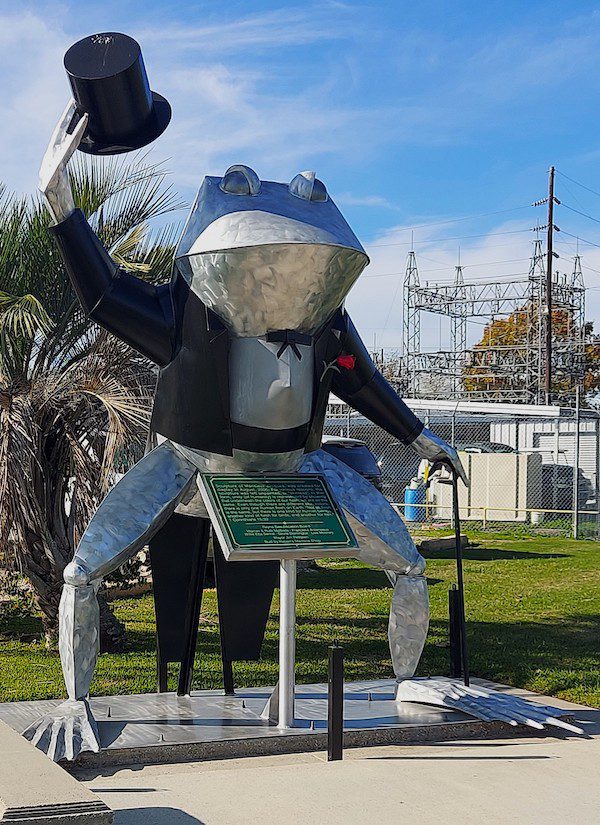
Monsieur Jacques greats visitors in Rayne / Photo by Karen Gershowitz
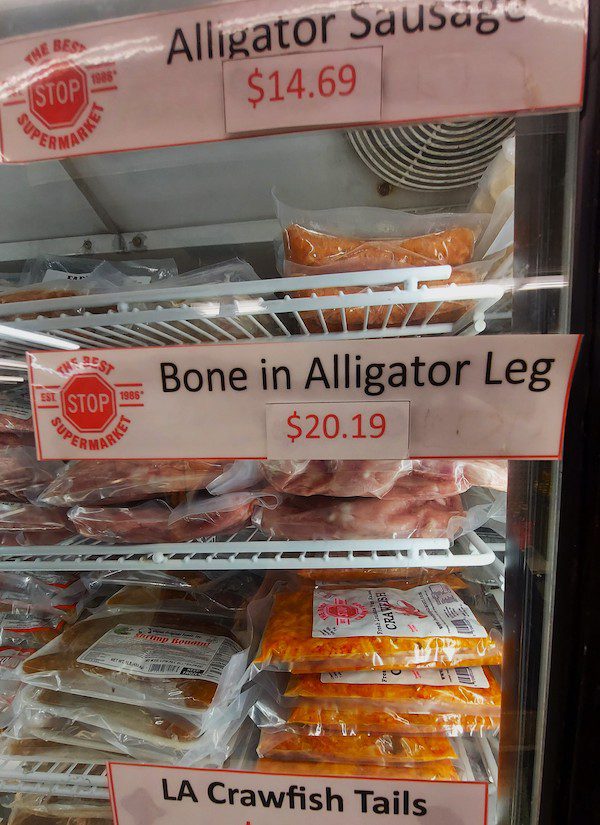
Unusual foods like alligator leg for sale in Scott / Photo by Karen Gershowitz
Henderson and the Atchafalaya Basin Swamp
The Atchafalaya Basin is the nation’s largest river swamp, containing almost one million acres. It is significantly larger than the Everglades. It’s home to sixty-five species of reptiles and amphibians, over two hundred and fifty species of birds fly in or through it and loads of mammals make it home: black bear, nutria, fox, muskrat, beaver, otter, and raccoon.
The highlight of my day was a swamp tour through the Atchafalaya Basin with McGee’s Swamp Tours. When we first boarded the boat, our guide, Ryan, warned us about carp leaping out of the water and jumping into the boat. I thought he was joking. He wasn’t. Within minutes, the enormous (up to fifty pounds) fish were leaping high out of the water and splashing down. Asian silver carp are an invasive species and create many environmental problems. We must have seen at least twenty of them doing their acrobatic leaps.
The tour took us through meandering fingers of the swamp where we saw lush cypress trees draped with Spanish Moss, herons, spoonbill cranes, even a juvenile alligator.
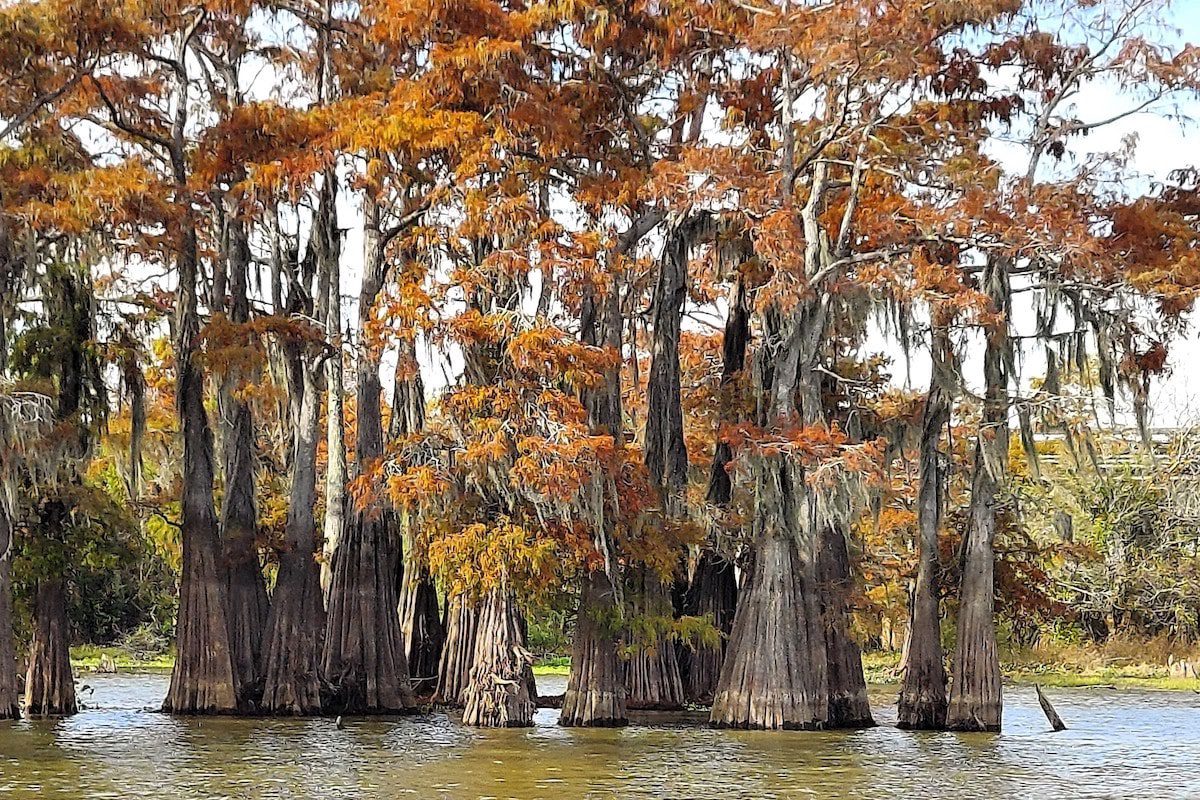
Touring the Atchafalaya Basin with McGee’s Swamp Tours / Photo by Karen Gershowitz
Avery Island, Jefferson Island and Delcambre
You can visit these three areas in a single afternoon.
Avery Island is the home of the famous Tabasco sauce. We bypassed the sauce exhibit, focusing instead on the Jungle Gardens. The garden, created by Edward McIlhenny, includes not just local flora but also Asian elements, like stands of bamboo and a large Buddha statue. It’s a birder’s delight, attracting both local species and migrating birds.
A visit to Jefferson Island for lunch at Rip Van Winkle Gardens offered serene views and delicious local cuisine. Afterwards, a detour to Delcambre provided a glimpse into the world of shrimp fishing.
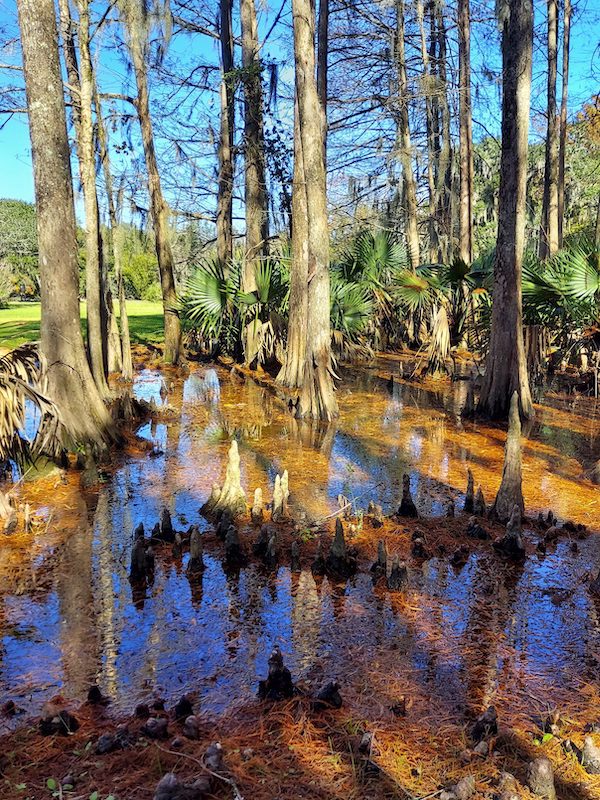
Swampy landscapes on Avery Island / Photo by Karen Gershowitz
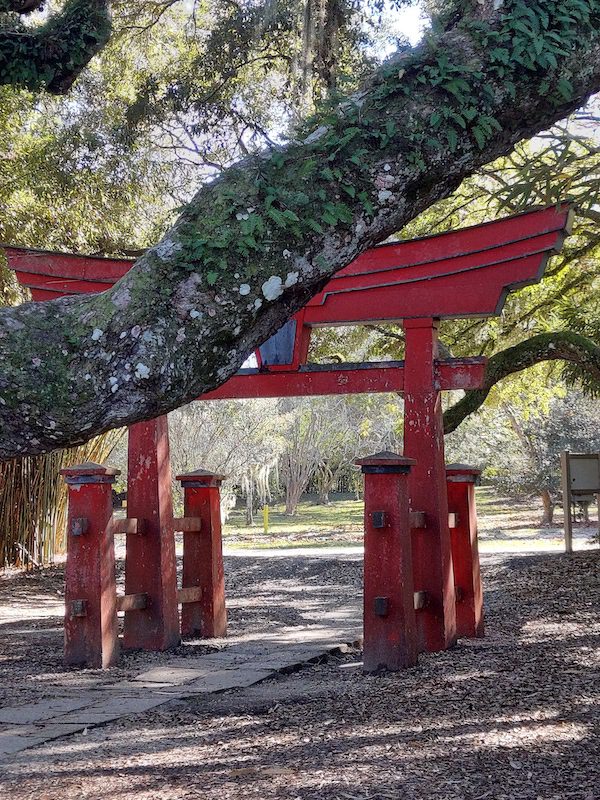
An Asian-inspired gate in Avery Island / Photo by Karen Gershowitz
Arnaudville and Grand Coteau: Crafts and Crafters
My friend Liz and I stopped in at Tom’s Fiddle and Bow to say hi to Tom. If you want to buy a fiddle or need to get one repaired, Tom’s is the place to go. If you’re in the area on the first Sunday of the month, stop by Tom’s for the music and potluck. I’m sure it’s great fun.
A couple of miles down the road is the NuNu Arts Collective. NuNu’s is a gallery, an art studio, meeting space, coffee shop, bookstore and more. I was especially taken with the woodworking. Walking around the gallery I ooh’d and aah’d at the gorgeous, handcrafted tables and furniture. As seems to happen everywhere I go, I got into a conversation with people in the shop. When they heard my appreciation of the woodwork, they introduced me to Larry Borque, the artisan who made it. He explained how the wood spoke to him, the process for inlaying marble into the wood, and more.
We managed to tear ourselves away and headed to a nearby town, Grand Coteau. There we visited the Kitchen Shop, which has a lot more than kitchen ware. We ate lunch at The Hive, a multi-function space (like just about everywhere else in the area). It’s a coffee bar, restaurant, shop, and event space.
For those seeking a true taste of the South, away from the bustle of big cities, this region is filled with cultural and culinary delights. Whether you’re a nature enthusiast, a foodie, dancer or a music lover, Western Louisiana has something for you. The rich history and traditions are a living, breathing part of daily life. Even better, the warmth and hospitality of the locals make every visitor feel like part of the community.
So, pack your bags, grab your dancing shoes, and prepare to eat fabulous food. Come to Western Louisiana for the crawfish, stay for the music, and leave with stories you’ll be eager to share.
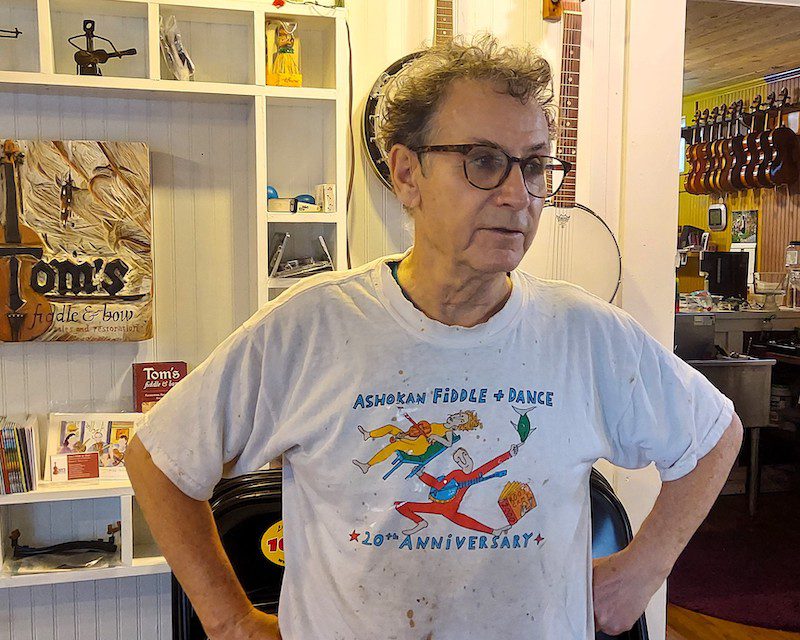
Tom, of Tom’s Fiddle and Bow shop / Photo by Karen Gershowitz
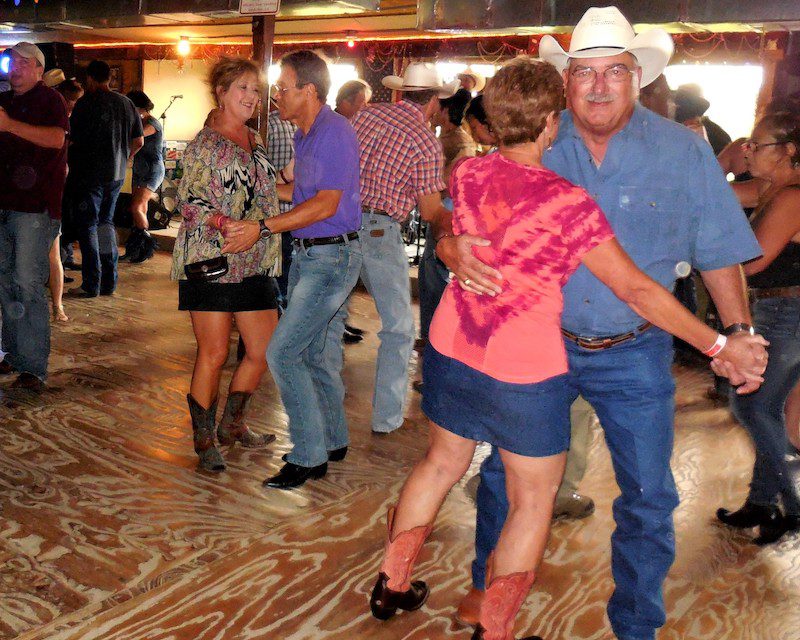
Dancing and live music can be found all over / Photo by Karen Gershowitz
If You Go to Western Louisiana
Getting Around: I recommend renting a car. The venues are far from each other and having a car will also make it easier to visit the surrounding area. Parking is easy no matter where you visit. Search for a rental car here!
When to go: For anyone planning a trip to this region, I recommend arriving on a Thursday or Friday to catch the best live music. If you want to sample the freshest crawfish, plan to go from January to May. I’d avoid the summer months when the weather can be hot and humid. Find the perfect place to stay here.
Food, Music and Dance: A few of the places I’ve been to and can recommend are the Zydeco Brunch at Buck and Johnny’s every Saturday morning in Breaux Bridge. La Poussiere Cajun Dancehall in Breaux Bridge, Bayou Teche Brewing in Arnaudville, and the Feed n’ Seed in Lafayette. But there are dozens more venues. Go here for a complete listing.
Disclaimer: Karen was a guest of the Lafayette Convention and Visitors Commission and The Louisiana Office of Tourism, which did not review this article before publication.
More to Discover Across the USA
Florida Removes LGBTQ+ Pages From its Website, But Why?
In a move seen as unwelcoming, the Florida State Tourism Board’s “Visit Florida” site quietly deleted pages dedicated to the LGBTQ+ community.
Destin, Florida, an Undiscovered Gem on the “Emerald Coast”
Located on Florida’s west coast, Destin has evolved from a sleepy fishing village to a safe, accessible place for older women to enjoy white sand beaches and an active lifestyle.
Where to Stay in New York City: Recommendations From Solo Women
Women share their top choices on where to stay in New York City, including hotels, hostels, and affordable options across the city.

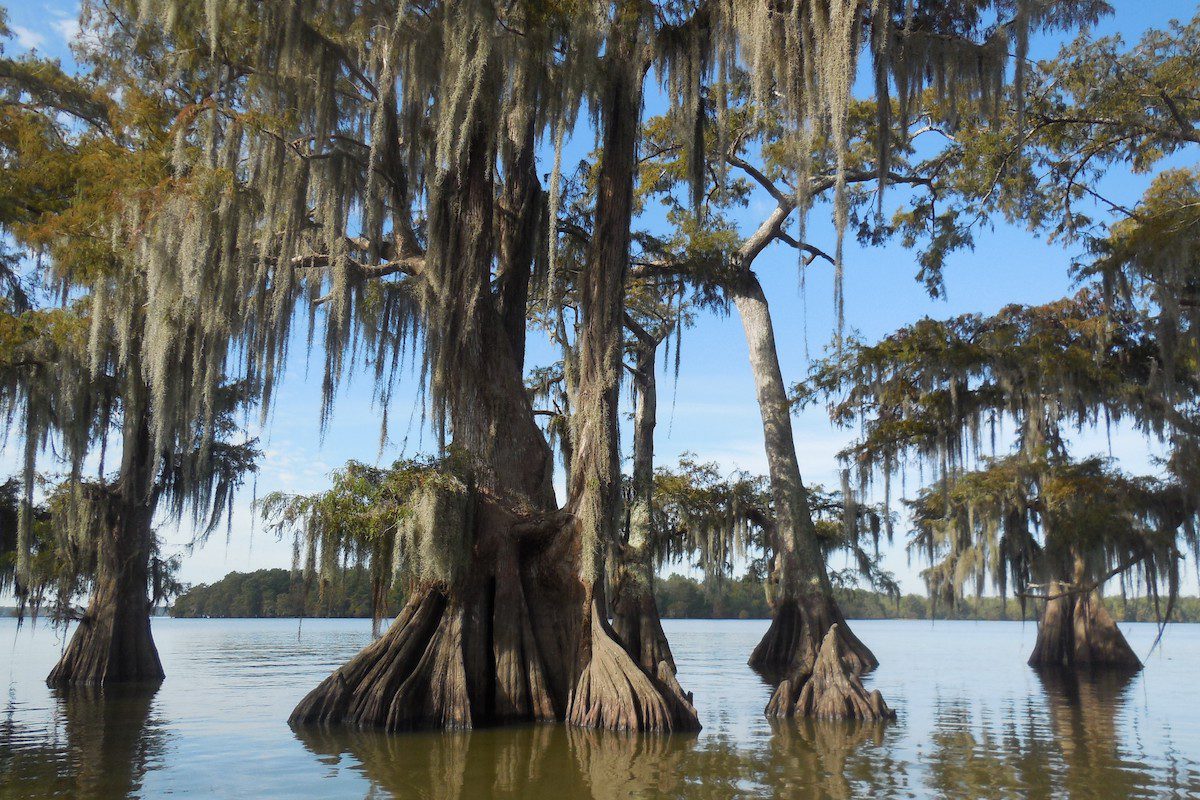



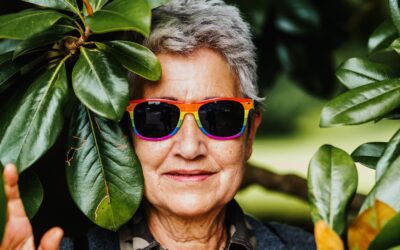
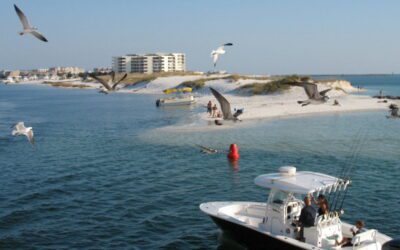
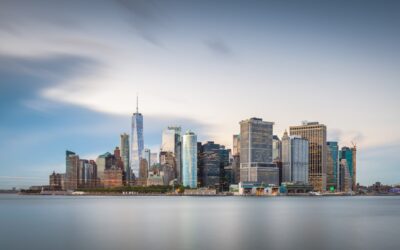
0 Comments
We always strive to use real photos from our own adventures, provided by the guest writer or from our personal travels. However, in some cases, due to photo quality, we must use stock photography. If you have any questions about the photography please let us know.
Disclaimer: We are so happy that you are checking out this page right now! We only recommend things that are suggested by our community, or through our own experience, that we believe will be helpful and practical for you. Some of our pages contain links, which means we’re part of an affiliate program for the product being mentioned. Should you decide to purchase a product using a link from on our site, JourneyWoman may earn a small commission from the retailer, which helps us maintain our beautiful website. JourneyWoman is an Amazon Associate and earns from qualifying purchases. Thank you!
We want to hear what you think about this article, and we welcome any updates or changes to improve it. You can comment below, or send an email to us at [email protected].